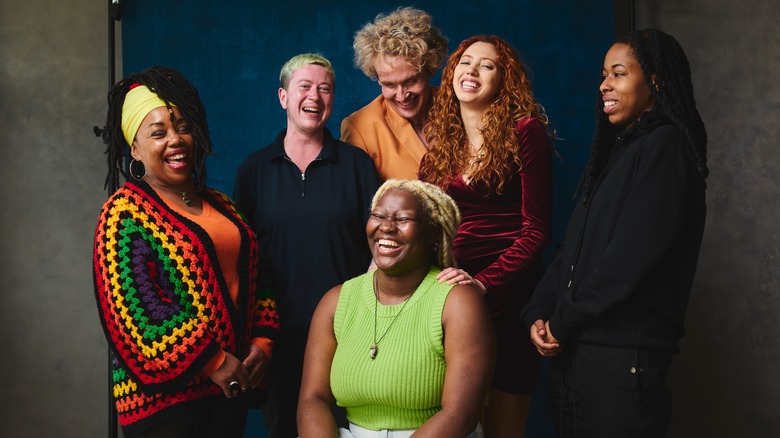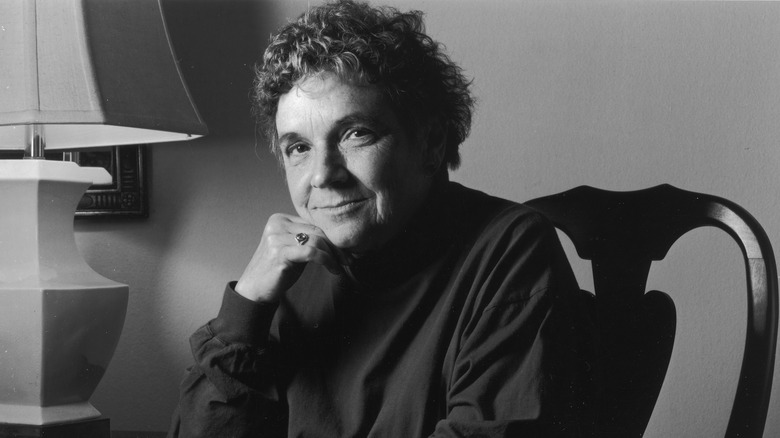What Is National Coming Out Day?
On October 11, 1987 around three-quarters of a million LGBTQ+ individuals converged on Washington D.C. for the Second National March on Washington for Lesbian and Gay Rights, according to Iowa University Libraries. One year later, psychologist Richard Eichberg and LGBTQ+ rights activist Jean O'Leary declared that date, October 11, National Coming Out Day. Since then, National Coming Out Day (NCOD) has grown, providing support for individuals seeking to come out to friends, family, and colleagues about their sexual orientation, per the Human Rights Campaign. In the LGBTQ+ plus community and beyond, NCOD is now widely seen as an important part of LGBTQ+ life, though certain views on coming out have changed.
On the importance of coming out, NCOD co-founder and author of "Coming Out: an Act of Love," Dr. Eichberg said in 1993, "Most people think they don't know anyone gay or lesbian, and in fact everybody does. It is imperative that we come out and let people know who we are and disabuse them of their fears and stereotypes" (via The New York Times). Also in 1993, Eichberg and O'Leary's National Coming Out Day Organization and the Human Rights Campaign Fund merged, and in 1996, the National Coming Out Project was formed to offer further resources and support for those choosing to come out, or anyone exploring the option. Today, Eichberg and O'Leary's celebration is observed in places far away from where it originated in D.C., including in England, and Ireland.
'Coming Out' definition and controversies
As the American LGBTQ+ suicide-prevention nonprofit The Trevor Project notes, coming out means different things to different people, and there's no right or wrong way to do it, nor should an LGBTQ+ individual feel pressure to come out to everyone in their life. There are very real reasons, including personal safety, employment considerations, and family dynamics, that someone may choose not to come out at all. The Trevor Project also says coming out can sometimes be a step people take at different times and in different ways as they grow and change.
On that note, in her 1980 essay "Compulsory Heterosexuality and the Lesbian Existence" feminist poet Adrienne Rich (pictured) — who came out as a lesbian in 1976, per The Times — suggests the notion of "coming out" implies heterosexuality as a default setting. Also, in 2013, Preston Mitchum wrote in The Atlantic, "The danger in over-emphasizing coming out is that the act, at least in the short term, benefits the group sometimes more than the individual," especially for those who may belong to multiple marginalized communities, he said.
Mitchum added, "The last thing a closeted LGBT individual needs, faced with a hostile social environment, is to feel like those individuals most accepting of his or her identity won't support him or her unless that identity is publicly proclaimed."
'Coming Out' versus 'Letting in'
Since National Coming Out Day's establishment in 1988, some LGBTQ+ individuals have redefined the act of coming out to better suit their individual experiences. Rather than an act of confession, as implied by the term "coming out" some now prefer to call it "letting" or "inviting" in, suggesting a different kind of discretion and control over the act by choosing to let select individuals into one aspect of their personal life.
On letting in versus coming out, Robert Espinoza wrote for HuffPost in 2013. " ... [M]illions have paved the way for queer rights around the world by naming their identities and challenging their circumstances. But the narrative doesn't work for all of us, and it hinders the dialogue on fluidity, life circumstance and gender variance ... In this context, on National Coming Out Day, I ask: Has a narrow conception of coming out done more to limit than to liberate our sense of community as queer people? And what should we come out in support of — not just from?"
Accordingly, on their website Skidmore College lists the pros and cons of coming out, with many benefits added but some potential risks to consider. On the continued value of National Coming Out Day, though, Stonewall.org writes, "Coming out has always been an important part of LGBTQ+ history. For those who are questioning their identities or living in an unwelcoming environment, seeing someone come out — whether it's a YouTuber, a family member, a teacher or your best friend — can offer a feeling of hope, solidarity, and reassurance."


